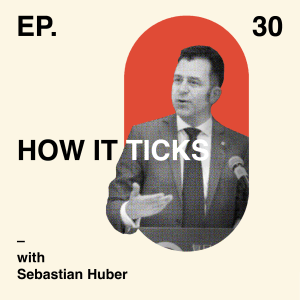
The Swiss Military: How A Neutral Country Prepares For War | Mathias Müller (#31)
Episode Summary
My guest today is Mathias Müller, an elected member of the SVP party in the Grand Council of the Canton of Bern. He is a career officer in the Swiss Army and was previously the commander of recruitment for the Swiss Armed Forces. In addition to his military and political work, he is an author and hosts the official podcast of the Swiss Armed Forces, which gives him a unique perspective on the country’s public discourse on security.
Expect to learn about the paradox of a peaceful nation with a strong military and how this relates to its long history of neutrality. We’ll explore the core philosophy of the Swiss militia army and how it compares to professional armies, discussing the effectiveness of its unique part-time system. We also dive into the ongoing debate about conscription, public support for the military, and how Switzerland’s defense strategy adapts to modern geopolitical challenges.
Meet Mathias Müller
Mathias Müller is a career officer in the Swiss Army (Colonel in the General Staff) and an elected member of the SVP party in the Grand Council of the Canton of Bern. He previously served as the commander of recruitment for the Swiss Armed Forces and the commander of the Infantry Officer School. He holds a degree in Work and Organizational Psychology and Media Studies from the University of Bern. In addition to his military service, he is an author and directs the official podcast of the Swiss Armed Forces. His book, “Wie entscheiden Sie? Führungsbeispiele aus der Praxis”, was published in 2016.
CONTACT & RESOURCES
Mathias Müller’s Websites:
- Personal Website & Blog (“Der Stoic Pirate”): www.muellermathias.ch
- Official Swiss Army Podcast: Information Swiss Armed Forces (Podcast) (Search for on your favourite platform)
- LinkedIn: Mathias Müller LinkedIn
Full Transcript
[00:00:00]
Mike: Switzerland has not been to war in over 150 years. Do they really need a military?
Mathias: Yes. And, and you bring out a very, very, very good point. We didn’t, yeah, we didn’t, we were not engaged in a war since you’ve said 150 years. The last war we had basically was our civil war, but, but we had some, we saw some action in the second World War. That’s a small one. But you know what, that’s exactly why we didn’t have war, because we have a military, because we have a strong military, because we have a military that tells a potential enemy, Hey, wait, you have to pay a big price if you try to enter, Switzerland.
And that’s exactly what happened in Second World War. Germany, they had plans to invade Switzerland. It was called the Operation Nan Bone. But it, they came to the conclusion that you need so many divisions to attack Switzerland. To take Switzerland, that it’s not worth it all.
They would probably have done it, but they were like, they had like other theaters where they were [00:01:00] already engaged, but they didn’t have the numbers to invade Switzerland. So our, our philosophy was always make the price for a potential attacker as high as possible. So he thinks twice or even three times before attacking.
And there we have one big, advantage to us, our terrain. We, we use our terrain to our advantage already. Our terrain is like, it’s, it’s difficult for a potential attacker. We have so many passages where you have to go through, where we can stop an enemy or something. So that makes it already difficult.
But since we were prepared always to pour an attack, we, we made the price as high as possible. And then one thing I would like to mention here too is we are neutral, but we, our neutrality was always called armed neutrality. Like the other countries, they said, yes, Switzerland, you can be neutral. They actually, they op, they, they, we Switzerland didn’t want to be neutral at the beginning.
It was the [00:02:00] other countries who said, you have, you will be neutral, but you have to be able to defend your territory. But why? Because the Germans and the French, they were always arc enemies in the back in the days. So they said, well, we don’t want that. The French suddenly go, make an alliance with Switzerland or they go through Switzerland to attack Germany.
And the German said the same thing about the French. So they said, you have to be able to defend whatever troop is coming and you are not never gonna let anybody pass. So that’s why we have peace because we’re neutral and they always had a strong, strong military.
Mike: Hmm. I also suspect that they are allowed to be neutral because they haven’t been attacked. Right. I imagine if they were attacked by Germany in World War ii, they’re not neutral anymore.
Mathias: I don’t know. We were not attacked. So this is a hypothetical question. And no, I think if we would have been attacked by Germany, we would have not been neutral. Then we of course, I mean it’s, anyway, it’s [00:03:00] like, it’s always kind like also how do we define neutrality? During the second World War, of course, we were like closer to, to the Americans and, to the allies during Cold War, we, naturally we were a capitalistic country, so we were much closer, to the western world than to this, the war show pact to, to Soviet Union, of course.
But we still maintained a certain neutrality, which I think is important in, in this world today, that there’s a place. Where, where enemies could meet also, where they know we can go there and we can talk. I think I, I’m, I’m very, very, convinced that our neutrality has helped us a lot in this, in the last years.
That said, it only helped us because we were, we had a, we had a military was able to defend and we had our terrain. I’ll give you an example. Belgium was neutral, but nobody cared about their neutrality. They were just ran over. And if you [00:04:00] talk to a Belgium today, a Belgium will tell you, oh my God, like neutrality.
The biggest bullshit, never again. You know, they, they, they made bad experience, but they don’t have the same terrain like us. And I think that helped us a lot. So we made good experience. And so, so I think that’s, that’s, yeah, that’s one of this at the end, this is one of our, factors of success.
Mike: Hmm. Besides traditional defense, what is the role of the Swiss military today?
Mathias: Yeah, like you said it, like there’s, I mean there’s, the role is mainly defense. Everything else is secondary. It’s nice when there, there’s some other benefits, but the role is to defend. But what a, what a very nice and a very important side effect is, and without the military, we, we would never have that is the Swiss armed forces are a major tool for the cohesion of our country. [00:05:00] Like it’s the biggest melting pot we have in Switzerland. It’s, it’s diversity, pure it. You think about it, it’s like, you know, if you think of small Switzerland’s, the only country in the world that has literally four different national languages has 26 different cantons with, with really different cultures. We mix together without any problems. People sometimes tell me, yeah, Canada, what, you know what? Canada is only the province of of Quebec who speaks French. They don’t like really the other ones, they actually have troubles they wanted to separate and all that stuff. You have the province of New Brunswick, the only one who’s really bilingual.
But besides that, the ANGs are ANGs. The, the, the Quebecers are French. In Switzerland, that’s not the case. We are, we, we feel as one, and that’s big part because of the military. And I can explain it, you know, when you’re like a kid, when I was like 20 years old, you come just out of gyms of, of high school.
You, you think you’re the king of the world because you [00:06:00] just pa you, you know, you’re like, you think you know it all. And then you go to recruit school and you, you are out, you, you have, you’re forced to get out of your bubble or you have a bubble where you live. You’re like in its environment where everybody’s a little bit the same.
They have all about same socioeconomic standards where you live. You went to school with your friends, they also have about the same standards, intellectually and everything. So now you’re taken out of your bubble of, out of your B bio, and you go to the recruit school and suddenly you’re like the same.
Everybody’s the same. You have same uniform. The, the, the, the superiors, they don’t care if you have a, if you have a degree, if you have, if you’re on social welfare, if you, if you did an apprenticeship or, or whatever, or if you, if your dad’s a millionaire or if, if you have only, if you, you never met your dad, they don’t care.
You are all the same. And on plus these people come from all over Switzerland. So suddenly you’re like with a guy, you, you know, you, the guy from Zurich has to share [00:07:00] is in the room with a guy from Geneva. And, and that’s worlds apart. You know, it’s like, and the guy from up Andell or whatever, from a farmer from up Andell is together with the guy from Zurich who never was, saw a cow in his life.
You, you share that, you know, and, and after like two, three weeks, you become one and you start appreciate first you’re like, oh my God, they’re weird, you know? And then after a while you start appreciating, you’re like, you know what? God, thanks. You have this guy. Like, you know, as I said, you know, like we like you, normally you do the, the, the military before you go to university.
And so, and, and as I said, you think you’re the smartest and everything, but suddenly you’re there. And let’s say you have to change a ti a tire or something, or put the chains in the winter on the Jeep, you know, and suddenly you’re really happy to have that guy who’s like, a car mechanic where you like, oh my God.
Yeah, he has only, he did only an apprenticeship and he is not too smart. But you know what? You’re glad you have him. And suddenly you start appreciating everyone for their [00:08:00] strengths they have. And you realize that there’s more people in just the ones you know, and it, it makes you. Much more an open spirit.
And to be honest, I come, I come from Bial bien, so we speak there is really bilingual. But to be honest, I learned French in the army. I had French in school, okay, but nobody likes to have French in school. Even nobody likes, foreign language in school, so you’re not really interested in the military.
I came there and the instructors, they were like, you know, it’s very simple in the military, they were like, you come from Bial. I’m like, yeah. So you take, you go to the French. I’m like, what? I’m, I’m not speaking French. They were like, you’re from Bial. You speak French Point. That’s how it was. And so I had no choice, and I’m speaking better French today than all my classmates who had like, great marks in school.
So no, I wouldn’t, it’s really like, it’s a melting pot. It’s like it brings us together. And I think without that, I don’t know if Switzerland would be, have such [00:09:00] a cohesion about, you know, with all these different cultures, with all these different languages. Urban and rural and all that stuff like we have today.
Wouldn’t it be for the military?
Mike: Hmm. Can you explain to me what the setup is of the Swiss military? So most people are part-time contributors to
Mathias: Yes. Oh yeah, yeah, yeah. Like that’s a, that’s the main thing. Like we have, we have a conscript system, so we call it, it’s always a little bit confusing, but we call it the militia system, which is actually, it’s a correct name. It’s a militia, it’s a armed citizen. But I know people always hear, they’re like, or Americans, what?
Militia Then they think of some, some crazy, people who prepare for some ima imaginary war or whatever. No, but it’s like, it’s, we have a conscript system so every able young man, it’s supposed to serve. So now what we have, we watered it down a little bit, to be honest, which I don’t think it’s good, but that’s how it is.
So when you’re 18 years old, you have to go to the recruitment. Every young [00:10:00] man has to go to the recruitment. They test you. And if you’re able, if you’re physically, mentally able to do the military service, you have to do the military service. If you don’t like, and some people don’t wanna do it, they can choose civil service.
So that means they will do, they will help , in a, in a hospital or, or whatever, like, go help do some social work. That’s the idea was that people who have a problem with the conscious, I con with, with doing military so they can, choose something else. So, but every, basically you’re, you, you’re suppo you, you have to do, according to the constitution, you have to do.
But if you cannot, because you’re, you’re conscious, you can choose something else. So. S that’s, and then of course there’s a lot, there’s some people who cannot do military service. They have physical or psychological problems. But basically the idea well is that every able man does military service. I said it was [00:11:00] watered down with the civil service.
It’s also a little bit watered down because we are, we, we shrank our military. We have now an, like, we have now a hundred thousand plus, 40,000 reserve. Before we had six to 800,000 people in the eighties. This is huge. So really there everybody did. Nowadays we don’t need as many. So, so if somebody has a cer has a little bit medical problems, they don’t need, they don’t have to do it.
What’s interesting that said is you have now more people who complain that they’re not allowed to do the military than the other way, way around, which is also kind of cool.
Mike: They’re complaining that they’re not allowed to do the military because they don’t meet certain criteria.
Mathias: Yes. Yeah. So we have more pe Before it was always the other way around, you know, and when really everybody did it, people were complaining.
It’s like, oh, I can’t, I have a knee problem. So they have to check. And they made, you know, but now it’s like we say people, we tell people, oh no, you can’t, you have a knee problem. And then they write us. It’s like, Hey, come on. I’m playing soccer. I do work. I want to [00:12:00] do it. I don’t, I’m not a guy who, who, who’s I, I wanna do it.
It’s, and it’s interesting, there’s, this is little bit of shift in, I think with the young people, so,
Mike: How effective is a, this Militia system where regular people are leaving their day jobs to join the military for a certain part of the year compared to a full-time military, which is what I think of when I think of military.
Mathias: Yes. That’s a good question because it’s, it’s something everybody think, asks themself and, and that’s an argument you hear often. People tell me. But wouldn’t it be better to have just a professional military where everybody is highly motivated to do and they’re, they, they want to do it? And now you, we have people who do it, who maybe don’t even want to do it, or they just do it part-time.
So one thing is what we have, we have, as I said before, we have everybody who does the military more or less. So imagine all the knowledge we have. We have, I had, when I had a battalion, when I was commanding a battalion, [00:13:00] 1500 people or a company with 150 people, I had people in my company from all walks of life.
I had people who were professor at universities. I had social welfare people. I had people who were engineers, I had architects, I had everything. You have such a big knowledge. Everybody brings his backpack with knowledge from civilian life. This is incredible. If you have a problem, you will find somebody within your you unit who’s able to solve it.
In the nineties when I went to when, when we did our repetition course and in the nineties the, the internet came was just kind of like, come, was new. I can tell you I always had internet, even in the military, officially didn’t have internet. It was like, what? Within an hour somebody was putting it in place.
They, you, you always have people who know stuff and that’s the big difference. I saw it. I spent one year in the US Army. Great. Like I loved it there. It was great. And the officers were amazing. [00:14:00] I have to say really cool people. The soldiers, they were good people, but no knowledge. They knew, all they knew was soldiering. That’s all they knew. And they, it was a lot of people who joined the military in the US who were people who hoped that they can provide a better life for their kids maybe or something. But it was people who didn’t have any. Who didn’t have much. We have people that from all walks of life, so this is huge.
I think like from the, from the brain power we have, it’s the best military you can have. Then one another thing that is really, really good, and I really like that and I have to stress that because we have people who are not all volunteer. Some do it because it’s the duty. Some say I, yeah, they say I have to, that’s, I understand, but I’m not a fan or something. We have people who are critical thinkers and as a, as a battalion commander or as a general or something, you cannot [00:15:00] just order anything. You have to convince your people, because these people are thinking also, they’re not just following orders because they’re like, you know what? I’m here three weeks a year.
You better explain me what I have to do and why I have to do it, and, and that’s a very, I think it’s a very important thing is that you have an organization that is also questioning the why and. It helps us also not to do stupid things, you know what I mean? But if you have a, a military where people are just paid, they just follow orders. They just follow orders. But with us, that’s not the case. That’s the, so it’s, it’s the sovereign who is doing the military service and you cannot just play with them like as you want. You have to be convincing, you have to think twice before you order something. People do it, but you cannot just order any bullshit, send it, just say, you know what, no, I’m not gonna do it.
And what do you wanna do?
Mike: Hmm.
Mathias: part-time. They just go home, you know, like, or you put them in two days in prison or something, they don’t care. So you really have to, you [00:16:00] have to convince them and, and as I said, the knowledge they bring with, it’s amazing.
Mike: But do you think that only being part-time doesn’t really connect you with the idea of actually going to war if you need to? So then if there is a war, the likelihood of these part-time soldiers is, you know, everyone’s scared. So do you think that is a risk?
Mathias: I there, there is a risk that people will be scared, but you know what? Ours, our military is purely defense. We should, we cannot, we like, you know, I, I, I had, I just talked today with about some, with somebody, you know, the US changed the name from, now to the war, ministry of War or Department of War, you know, you know from defense.
And that’s okay. That’s okay. They, they do war. We would do defense. We, we are not attacking anybody. And I think if you defend your home country, if you defend your family, if you defend your region, you will be motivated. And we see it in the Ukraine. These people are fighting and, you know, they didn’t even have [00:17:00] training. They have very, very short training and they still fight quite a lot. And you see on the other side, you have basically a, a superpower who is since, now three years trying to achieve something. But they have a hard time because if you defend, I think you have the, the willpower to defend. Of course, there, there’s, there are gonna be, people are gonna be afraid.
I think also professional soldiers will be afraid the first time they’re in battle. We all will be afraid, I guess. I think.
Mike: If you are. Working full-time on your job as part of the military is to train everybody. Are you essentially every few weeks just training people on the same thing over and over and over again?
’cause you continuously just get new people coming through . So everyone’s more or less getting the same training at just different times of the year.
Mathias: Yes. Kind of like, yeah, so of course you have the different, different kind of troops. You know, tankers have a different, instruction. They learn different things than infantry or medics [00:18:00] learn something different. But yeah, we have, we have some professionals and basically they’re instructors. They enable the, the citizens to be soldiers. That’s exactly what happened. The recruit school goes 18 weeks. So, some instructor, there’s one, one or two instructor per company. They, they, they’re 18 weeks with them. They train them, they coach them, they help them organize. But the role is kind of like a coach. More like a coach. Because what we do is also, you know, you, if you go up in the rank, like say you’re a recruit and you’re a good recruit and you, we can convince you to become a sar sergeant. So you become a sergeant, you do extra time, you do like, you learn to become an, a non-commissioned officer. You learn, you do some leadership courses and then you train recruits. Then you be, you can become a lieutenant. So there’s, it’s all [00:19:00] conscript from the company commander, the who runs the 150 people.
Then there’s the platoon leaders. He has like four or five platoon leaders, lieutenants, and they have again, three, four, sergeants. And then there’s recruits and they’re all militia. They’re all, part-time and per company you have like one professional officer, maybe one or two, non-commissioned professional officers.
And they coach, they coach this company. So they don’t train everything themself, but they train the trainer basically. So, so that’s how our system kinda like works.
Mike: I imagine is there much demand to stay? Can you stay longer? I didn’t actually ask you what is this specific time period per year that people contribute, but can it be longer than what the maximum is? ‘ cause I can imagine, you know, if you’ve been joining the military, you’ve been driving a tank for the last couple of years, and then you get promoted and now you get to run a squad, that, that, that could be more interesting than your normal job.
Could you do that for longer if you [00:20:00] wanted to?
Mathias: if you know you have to become a professional
yeah, you would have to become a professional. That’s exactly, you know, the thing I said before, we have more, we have now more and more people who say, Hey, I would like to do a little bit more. I would to do it a bit longer. And actually now, right now we’re thinking of if people sh should be able to do volunteer, voluntarily a little bit longer.
But right now you can only very limited. Like you, you’re only allowed to, I think to do 60 days a year and that’s it. Why? Also because we don’t want that people. If they have, if they’re like unemployed or something, they just, oh, I do like three or four repetition course a year. You know, like it’s not the idea, it’s not like, to, to help people bridge the time that they’re unemployed.
So, no, you’re, you’re not allowed to do much extra service.
Mike: Hmm. And what are your, what are the requirements given that 20 something percent of the population living in Switzerland are non Swiss? What are the requirements to join the military if you’re not born Swiss. [00:21:00] Mm-hmm.
Mathias: And normally it’s, you know, you have to do the military service, but the recruit school, until the end of your 24th, year, year, like you have to be 24 years old. If you’re 25, you’re basically too old. Now. You, there’s exceptions you can ask if, if, for whatever reason.
So if you are a new citizen. Let’s say you become your past, you become your citizenship. You get your citizenship at 26. You could ask to do the military service if you would like to. We have such people, and then we do this. We can, we, we do exceptions. If, even if the person’s already 26, the latest people will do it at 29. But normally it’s if you’re a new citizen, you need to pass, you need the citizenship, and you should be younger than 25.
Mike: I missed it. I’m in the process of getting my citizenship now, but I, I think I missed the boat.
Mathias: How old are [00:22:00] you?
Mike: 33.
Mathias: Well, as I said, I can always try to make an exception if you want. No, 33 is, is, is would be a little bit difficult.
Mike: I was wondering about how necessary it is to have the, mandatory component of, conscription and I looked up. Other countries within Europe. Who else has that? And I have this list, there’s eight other countries within the European area are putting aside Russia, Ukraine for the moment. For obvious reasons.
Austria, Greece, Lithuania, Latvia, Estonia, Finland, Sweden, and Norway. And I thought, well, Finland, Latvia, Estonia, Lithuania. That’s quite obvious why they would require that, of course, given the geo geography. But I wonder for Switzerland being where it is, do you think the mandatory component of that is necessary?
Mathias: I think so. And of course, in a perfect world, I’m, I’m somebody, I’m a very, I’m, I call myself a libertarian and, and I’m very much into like, as much as everything should be more [00:23:00] or less, free, you know, and, and in a perfect world, people will choose to be volunteer, to do, to do something, I think.
But I don’t think we’re there yet that people would really do volunteer. There’s a, there’s a lot to do actually. Now I, I have feeling a lot of young people right now, they see also why, because of the war in Ukraine. So there’s a, they, they know the why, but, I think it’s, you know, it is basically volunteer now in Switzerland because you can choose civil service.
You know. I was commander of the recruitment of the Swiss Armed Forces Forces and everybody that came to recruitment, I said, like, I, I wanted to know from each person at the recruitment who said I want to do civil service. I wanted to know why. And we actually also did some studies, the Huke Hawkes rule on Colin made a study about that.
Why do people do civil service? And you know, how many percentage choose civil service because they have a problem with their consciousness. What do you [00:24:00] think?
Mike: With their consciousness as in the,
Mathias: with their morals? With their,
Mike: No, I could imagine that would be with Swiss people. I could, being a pragmatic bunch, I would imagine that’s quite low. Maybe like five or 10%.
Mathias: yeah, it’s zero. Nobody’s that they did it. Everybody did it because of it’s more comfortable to do civil service. So this is an interesting thing too. And I think, and that’s a little bit sad because I think, people would profit a lot from doing the military service. I think they lack, they, they miss out on not doing it.
And I think if there will be a, a, a, a crisis situation, I think you want to be able to be somebody who goes help and, and is there. And if you’re able and fit and everything, you don’t wanna be somebody who’s hiding in a bunker. You know, that’s, if, if you’re fit specially, you know, you, you want to be somebody who helps the society in such a situation.
And I think, that’s why it’s, we should, [00:25:00] I think it’s better to make it mandatory. It’s a little, it’s a little something that we, that people have to do for their country. If they believe in the values we have, if they believe that they’re, they, it’s worse defending them if necessary. And as I said before, the bigger the military will be, the higher the price and the less we will need it.
Mike: Mm. Yeah, I looked up, when was the last, I was like, I’m sure there’s been a referendum in the past about, keeping a mil about the military. And I had a look, and last one was 2013. The question was, should the abolish the, the malicious system and it was overwhelming, was no.
Something like 75% said no, which is crazy for a, for a, referendum, and that was in 2013. And I wondered. With a new generation of people, the generation say like the, the millennials, and gen z , which have grown up with social media and the internet, if that number has changed, do you think, do you think the interest in joining has changed in, say, the last five to 10 years?
Mathias: Yep. And [00:26:00] actually, you, you, you watched, you looked up the last referendum, the biggest referendum was in 1989. That was huge. And you have to imagine 1989 it was, nobody questioned the military. It was like a holy cow. They even called it like, they made the advertisement with the cow and with a helmet on.
And they were like, this is a taboo. And so, so there was like this referendum from the group called Group Fish Rights on the Amazed, Swiss without military. And everybody was laughing about them. They were, everybody was like, yeah, this like, they’re, they utopians and they will know, have no chances of, and then the big shock came.
They almost made, they made more, I think 35% of the people said yes to abolish the military in 1989. That was huge. Everybody thought about it’s gonna be 90% and you know, they’re all like weirdos. And that was a big wake up call. And I say today, that was one of the best things that happened to the military because it shook the military and there was a [00:27:00] lot of changes.
There was a lot of reforms after that because yeah, it was a holy cow. Nobody questioned. So this. Lefties. Basically they questioned the military and it actually, I think it’s a good thing they did. So in 2013, it was already like going down like the, there was no, almost, that was the second time they tried no, much less people.
And I would say today, you would ask. Today I think it would be like 90%.
Mike: Hmm.
Mathias: And when I see, when I talk and, and it’s, it’s, a little bit sad because it’s, but it’s because of the war in, in the Ukraine and maybe also in Gaza and everything, war is much more present again than it was 20 years ago. And, and that’s, I see that with also with my kids were born 2000, four oh seven and oh nine.
It’s for them, war is becoming something real again, if you were born 1980, basically you, you know, after the fall of the Berlin [00:28:00] wall. So many people said, well, that’s it. There will be never any conflict anymore. There will be peace. And the European Union is a peace project and everybody will be there will just be peace.
And nobody believed that there could be any war. 2014, there was, the, the CRI premier, people were still like, yeah, well, but, and then 2022 came, and the Russian invasion, suddenly everybody’s like, whoa, whoa, whoa. No, we, we, that’s, that was not a, we didn’t expect that. Why do we do that? You know?
And, and now it’s back. And I think that’s a, the awareness is much more real and the, the threat is much more real. So right now, I don’t think there would be any chance for such a referendum.
Mike: Given that you are a recruiter, I wonder, do you see a difference in the personalities and the types of people now that are joining the military? What’s the personality of a 19-year-old now than what it was in, 20 years ago?
Mathias: Yeah. You know, the big difference I [00:29:00] think is that young people are, they’re less afraid of authority. You know, when I, when, when, when we were,
Mike: No respect is one way to say it.
Mathias: or, or, yes. No, not much, not so much respect, but you know what, it’s a good thing. They’re very polite, I have to say.
They, they’re polite and they do, they, they’re willing to do stuff, but you cannot just, you have to explain it also maybe a little bit more, or they question you. When I was a school commander as a colonel and you have like 20 year olds and you say, Hey, you do have to do that, and then like. Sir, why?
You know, it’s kind of cool. It’s, it’s because you’re like, yeah, why? I have to explain them that it’s like, and then they, they do it if they know why they do it with us. It was like a colonel said something we just did and we were like, oh my God, I hope, hope he’s not gonna ask me a question or something.
Now it’s much more, yeah, it’s, it’s not as, yeah, less respect or less afraid of authority, I think. But the willingness to do something is here. Maybe, [00:30:00] maybe they’re a little bit less physically, maybe what was physically, I think it’s, it’s interesting you have like some that are really, really good. They’re much better than we were I think 20, 30 years ago.
But then you have the other side, you have like the extreme that is really not fit, who never walked to school or something. So we have a little bit more extremes, I would say. I have feeling back 30 years, 20, 30 years ago, everybody was more or less kind of like the same level of fitness. Now you have a little bit like the obese, and on the other hand you have like the top athlete.
And that maybe changed. But you know what? I think the, to be honest, I, I like the, the, this young kids, the 20 year olds, you can do a lot with them. They’re willing to do stuff, but they need to know maybe a little bit more why maybe we needed it also, but we didn’t. Maybe they’re asking, we just did because, we had too much respect or maybe we were afraid of authority.
And that’s, they don’t have that.
Mike: Mm. How are you gonna continue? How’s the military gonna keep hitting its conscription [00:31:00] numbers when you have, the aging population you have, the mid thirties is when you no longer have to serve, and 22 or 3% of the population of Switzerland is now immigrants and not a Swiss citizen. It must be harder and harder.
Harder to find the people.
Mathias: Yeah. Actually, well, the thing is like this. Yeah. As I said, the military right now is quite small. Like, if you think about it, a hundred thousand people, we need, we need about 20, yeah, about 18, 20,000 recruits every year. So that’s, it’s feasible, but you’re, you’re right. It’s, it’s not getting easier because now we will have, birth years that are dropping for a while.
Maybe it could go up again, could be for a while. But now they, they, we have less, less, potential recruits. And one thing, what we could do, but that’s not us, it’s the politics. We could do. We, I said before, you know, we nowadays youer you make, you make your recruit school, you make six repetition course, and you have to do that until you’re 32.
So all you have to do is you can [00:32:00] add one repetition course more, or two repetition course more so you stay longer in the military. And so the effect, like the numbers would go up. As I said, my dad, he, I think he did to like 45 or 50 or something back in the eighties. You know, that was normal.
And, and that’s something also we can think, we could think about because. If you look at nowadays, a 50-year-old, a lot of 50 years are absolutely fit or 40 years old. They’re fit, they could do it. And it’s what’s interesting. We have, we actually have quite as few people who, who would like to go on in the military, but they’re not allowed anymore because they’re, they did their service.
And that’s also something actually we’re seriously thinking about is that if you want to do volunteer, if you wanna volunteer a couple more, repetition courses that you could, if somebody wants to do that, like a volunteer firefighter and says, look, I’m gonna do two more years, I, I’m fine with that.
I’m still fit. I like it. [00:33:00] I think, but I don’t know how many, but there is people who ask us that. So that’s for sure something. But I think the easiest way would be, just to make one or two repetition course more, and you have more numbers.
Mike: In 2016, a commission recommended extending conscription to women to meet annual demand for new soldiers, and they also found that there’s a defense ministry report in 2021 outlining a global, a goal to increase the percentage of women in the military from 1% to 10% by 2030. What’s your view on that?
Mathias: I think the 10% is completely unrealistic. Like this is, I don’t know where that number came from and how that, I, I think, to be honest, I don’t, I really don’t think that was really analytically, reflected. I think, I think somebody just said once it would be cool to have 10% and then they put 10%, as the goal.
And I said, I said once to the chief of the armed forces, I said, you know what? I have an [00:34:00] idea. I know how to reach that goal. It’s very simple. We just make the military, 90% smaller and to keep all the women. So, so what? You know, it’s already that number 10%. Why? It, it makes it, it 10% on, on how much? It’s like if you sm if the military is only 10,000 people, well then we would reach it.
If you make the military big, the, the, the, the numbers bigger again. I think what’s this, what we have right now is we have an increasing number of women, but we’re still like, I think something below 2% or something. But we have what? It takes a little bit time. And personally, I, but that’s a political decision at the end.
Personally, I don’t think, I wouldn’t make the military service mandatory for women. I, it’s like I said before, in some way it would be cool if it even would be not mandatory for men, if you would have enough men who will come. But I think if you think about it, if, if you [00:35:00] have a war. Time of war. And if you look at history, how many young men lost their life?
As if you look first World War or now Ukraine or something. Does it make sense that also now so many women would lose their life? Like somebody is also has to look that society goes on and, and you know what? Women had did a lot during wartime. They keep the businesses running, they kept the administration running, they kept the farms running.
Imagine all the, the same, all the whole generation, like some 10 years of, from, I don’t know, 20 to 30 year olds, they would be all in the military service.
Mike: Mm.
Mathias: I don’t think it’s a good thing, but I think it’s good that everything is open for women and the ones who want to join, they’re welcome to join.
And we have every, we, we, we do have every year a little bit more and the interest is, is. It’s, what’s interesting is that the interest is increasing. Not everybody does [00:36:00] the military service, but we do have this orientation days for women also. They’re always packed. It’s really interesting, like the 17-year-old girls, they go Listen and not all join, but it’s, it’s not a taboo anymore.
If you, 20 years ago, a woman would’ve, a young girl was like, I’m not going there. But now it’s almost like, oh yeah, I’m gonna listen to what they say. Why not? And, and, and, and that’s kind of cool. And I think that’s much more how you say that organic when it’s, it comes like this, that when women really want to do it, then if you would force them,
Mike: I was also reading about current events in Europe, and I know, well, it’s not that current, but a lot of, other western European countries like France and Germany are ramping up the military now that the US is pulling out. And I wonder, given the increased tension in Europe, do you think that this Swiss military is going to increase in size and budget?
Mathias: Yes. Budget is already decided. Like they, they decided that [00:37:00] we should, but you know, that’s ongoing discussions and, and I always say, say if the war in the Ukraine, what, for whatever reason, stop within the next six months, I’m not sure if in two years people are still talking about increasing the military budget.
It goes very quick in politics. And then they say, well, they will say, see, now we learned that was really the last war ever. Now there will be no war anymore. But no, it’s, it’s gonna increase because everybody realized now that we are not ready, we’re not ready. And suddenly everybody’s afraid. You see the drones and everything, and then suddenly like, oh my God, you’re not even able to shoot down drones because they, they don’t have anything anymore.
And at least we kept our conscript system. Now Germany. They are thinking of making, making the conscript system come back. But you know, it’s much harder to bring it back, now than than it was because they also made a lot of mistakes, because they also abolished [00:38:00] the infrastructure. So it’s, it’s easy to say in the Bundestag oh yeah, we are gonna go increase the military, let’s make conscript and we will have so many soldiers. They don’t even have room to sleep. They don’t have any training centers anymore. It’s, it’s all gone. The Swedes had the same problem. It’s like they, they said, boy, we don’t need anymore. So they sold all their barracks and all the training facilities, and now suddenly they wanna increase. It’s not just the numbers, it’s, it has the, in the infrastructure, the material, everything has to go together.
That costs a fortune and we see it now. The European Union wants to spend hundreds of billions. My question is, where do they take the money from?
They’re not gonna save somewhere else. So I think yes, we will have, we will increase, because in Swiss military we’ll also increase because we have some holes.
So yeah, we have holes in the military. You know, we have, if right now we could, if you take, we have, out of our 17 infantry battalion, we could equip like [00:39:00] nine fully or eight fully, you know, and the other’s not. So this is unfair.
Mike: Hmm.
Mathias: if it would be a war and you cannot equip your soldiers, this is really unfair.
Like that’s the minimum we need to have, material, guns and ammunition that you know, that you can defend yourself. If not, it makes no sense. So we will have to increase the military budget.
Mike: What is, how, what is the approximate per per capita spending on military compared, not necessarily a number, but compared to other European countries? Is it a lot?
Mathias: No, it’s very low in Switzerland. It’s below what is it like, like 0.9% or something of the GDP, and we want to go up to like 1.5. But that said, I mean we always talk about GDP and the percentage and nato, I think they ask two or 3% now, but that you spend on GDP. But that said, of course we have Switzerland is a very high GDP.
So let’s say if you, if you’re a poor country, if you’re a poor country, of course 3% is not, maybe our [00:40:00] 1% is more than maybe at another country, 3%. But it’s, it’s very low compared to social welfare, to to other stuff. It’s very, very low what we spend.
I always say, you know, the military should not be super expensive.
I think it has to be. Fair, fair to the soldiers. So we need the, I always say we need the cheapest military possible, but the it, the, it, it has to be as expensive as, as needed. You know what I mean? It’s like we don’t need to have extra or whatever. Like, we don’t need super, super, but we have to be able to defend our country and that’s the minimum we need, not more, we don’t need to exaggerate, but we need to be able to give our troops the material they need to fulfill their missions. Very simple.
Mike: What does the Swiss military have in terms of modern warfare? Like the tech, you see, you know, you read about some of [00:41:00] the crazy tech that the, the Israel has and America has. I wonder, does Switzerland get in on that as well?
Mathias: Yes. Well, right now, like the Patriot system is something we ordered, you know, the, the fence system. If you have the F 35 plane, that’s also, that’s now quite high standard plane. Yeah, we have, we do have some stuff we have, but, but also there’s also some stuff that is old,
like, yeah, right now our planes, they’re from 1993, I think we’ve voted about them.
The, the F 18, that’s, if you think about you would have a car from 1993. It’s an old time rule, at least a young time, right. I don’t know, but it’s like, it’s, it’s old and, and we have some stuff that dates back even to the seventies or so. So, of course the military material, you keep it longer and everything, but yes, we have to, we have, we are some stuff that’s old, some stuff it’s newer, but we have to, yeah, we have to be more, up to date again.
Mike: Hmm. And does [00:42:00] Switzerland have, I’m sure they do, but I really don’t know nothing about them. What is the special forces of Switzerland? Like, do we have a special
Mathias: yeah, yeah, yeah, yeah. Yeah. We have different types of special forces. You have a pro real professional part, like they’re a hundred percent, special forces. That’s like the people, if, let’s say somewhere Swiss people have to be rescued some somewhere in the world. That’s the guys who go, they’re like very secretive. They’re very highly trained. I heard from a friend of mine who was a special force in the US who had a very high, who, who said the Swiss Air have a re very, very high standard. So I, I believe him and I think the mission state did till now they succeeded.
So, but it’s a small force, but they have very good quality. And then there’s a special forces component who is again, conscript, like part-time [00:43:00] that are very motivated people who do that part-time. Like, that’s kinda like in the, I don’t know, in the US you have also special forces in, in the National Guard.
It’s similar, but yes, we have special forces and they’re very, very, highly trained. Actually, just about four weeks ago I had on the military podcast, I had the commander of the Special Forces of Switzerland. Like it’s, it’s worth watching it.
Mike: And I wonder, with the exception of maybe this Special Forces mission, just a general military, I know you’ve mentioned a couple of times now that it is very much defense, but is there any mil Swiss military presence in any other countries? I.
Mathias: For peacekeeping and peace support. It’s also part of our, in the constitution that we, we have to, do a part for the peace in the world. So we have people in different places as military observers. Normally unarmed, like, in the, in [00:44:00] the Kosovo they have, there’s one company, and, K four.
There is some stuff in the Balkans and then in different places in the world. As of service, one mission we have, the oldest one is the one in, between South Korea and North Korea. Where the Swiss are, like at the border together with the swes. That’s since 1950. Something like 54, I think, where the Swiss and the Swes are there between the two nations.
Mike: Looking ahead, the world as we see it, and all of how we get information, things are pretty negative. There’s wars which start, which don’t seem to end. And, political leadership, who people aren’t fond of. With all this going on and Switzerland still managing to navigate this as a neutral country, it’s the big question.
But are you optimistic about the role in which Switzerland will continue to play in the future?
Mathias: That’s a good question. And I don’t have a crystal ball and as you said, it doesn’t look [00:45:00] too, I mean promising right now I’m an optimistic person. I always hope that, I always think, we will, it will turn out in one or the other way, in a good way. But you know what, the things also, if you look at history, maybe the good times we had now the last 50 years, and if you look at history, there was rarely such long periods where there was just nothing.
And there was always some problems in, in turmoil and, wars or whatever. And maybe that’s what’s now what’s coming. Maybe we were also too decadent, to realize what we have and we let down our guard, as we said before, we didn’t invest in defense anymore, and now maybe we pay the price. We got too comfortable. But how, what, what does that mean for Switzerland? We’re surrounded by countries who are in the European Union, so they, of course, they, they put a certain pressure on us too, which is in some way also understandable. They, they say, Hey, we are surrounding you. We kind of like, you’re kind of like part of it, like try not to be, standing [00:46:00] apart always.
And of course Switzerland has, because that’s what I think we have a more democratic system than all the other countries because we have a, we have our society still more free than the other countries. Our society’s also more successful. Till now our economy. So that makes also maybe certain, you know, your other countries are probably as the envy.
They say, Hey, we have, we struggle. Let’s say we, we, we need money for the defense. If, if we have a good defense, it helps also you guys in Switzerland. So why don’t you contribute something? So I think there will be pressure coming on Switzerland and with all the stuff that’s going on in the world, Switzerland will experience some changes.
I think. I really think so because, we are also still connected with each on each other. And I don’t think the economy in Europe is going that well. European Union is not going that well, according to me. And, it’s still our biggest partner, [00:47:00] economical partners to European Union. And if the European Union is going down automatically, we also will, we, we will also feel it.
Mike: What do you mean when you say you don’t think it’s going that well?
Mathias: The economy is struggling. If you look in Germany, the debts are going to the roof, we have, if you look at Germany and in France and other countries, how much on social money is spent on social welfare? Now we, they have to spend money on defense, but they don’t have the money that comes in because the economy goes down, so there’s less revenue.
So how are you gonna pay for all that? Well, you can either cut on 1, 1, 1 end, or you can just print money. But if you print money or you make more debts, it means inflation. So it’s, it’s, right now I think we’re really in a, not in a good situation.
Mike: Hmm. Yeah. I think ever since I’ve known it, countries have been in debt and they don’t ever [00:48:00] seem, at least in my lifetime, they don’t seem to get out of debt. It just seems to keep getting bigger and bigger and bigger, and I’ve kind of always wondered at what point does it tip over? Do they just get into debt forever or is there eventually a tipping point?
Mathias: And, and that’s the thing. I think the tipping point is, I don’t know if you saw, you know, in France, when they made the, the referend, like the, what’s this, the, not not, but the, the minister, the prime minister who, who had the confidentiality vote and he lost it because he wanted to save money.
And, and the left said, well, you. That’s not, it’s not necessary. We just have to tax the rich and the, the extreme right said, well, we don’t have to save money. All we have to do is kick out the foreigners. Then we have money so nobody’s willing to save money. And he said, Hey, do you realize how much we spend on social welfare?
We cannot afford it anymore. It’s very simple and people just put their head in the sand. It’s like, well, it’s gonna go. Yeah, the other text, the rich, the other just kick the foreigners out. But that’s not how it’s gonna be gonna solve the problem. And I think we have to cut [00:49:00] somewhere and it’s gonna hurt maybe a little bit, but I think we need to, it’s, if not we, we are just, it’s gonna collapse.
I think.
Mike: Hmm. Matthias, this has been a very good conversation. What are you up to these days if people are interested to know more about you, hear your stuff. I know you’re very busy online. Can you please tell me, what are the things you’re working on that people can now discover?
Mathias: Yeah. As I said before, like go check out the Swiss Army podcast. Every two weeks it comes out. Go listen. It’s like very, it’s, I think it’s really interesting you have from the Chief of the Armed Forces, I just said you have the, the chief of the, the commander of the, the special forces. But I have also soldiers or just today I made a podcast with a, with a, with a guy who actually beca who was, who came here as a migrant and who was a special forces as a conscript and he was telling his story.
So there’s a lot of stuff we talk about that. So go check that out. Schitz are Made podcast on YouTube, [00:50:00] Spotify, apple podcast, wherever. And what else I’m up to is, you can also check out my, my personal podcast, which is called In. The Stoic pirate in, in English, but go Google it. Just find my website.
There I have a podcast. I do some monologues and, and so on. I have a couple books I wrote, that you can also find. One is about pirates, one is about, one is one is about, decision making about, well, short stories about decision making, and one is more, a little bit about, say, philosophy, stoic philosophy kind
So check it out. The website is, is www do Mueller, Mattias c Mueller with u, e, and Mattias with one T and H.
Mike: Thank you very much for your time.
Mathias: Thank you for having me.










